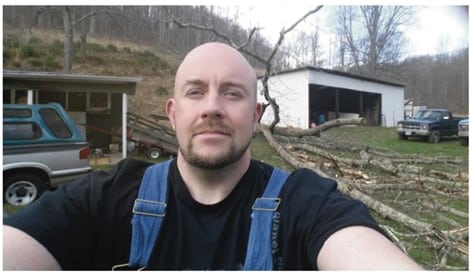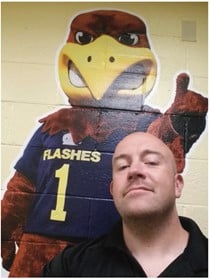It was Steve Flaughers’ father who taught him the most valuable sales lesson. “He said, ‘If you are going to sell stuff, you’ve got to talk to people. You don’t know what they need unless you ask.’ It’s worked ever since,” says Flaughers. His father was a master salesman. “He only went to school until the third grade. With no formal education, there were so many things that he just figured out, and I translate that into my business every day of my life,” he says.
Flaughers grew up on his family’s 120-year-old farm in West Virginia. “There’s barely any internet and a lot of hard work. In this rugged, mountain area, it was like we were just bred to work hard.” Responsibilities on the farm, like checking the fence daily to protect the cows, what he calls the family’s “walking investments,” varied each day and season. “The closest hospital is 40 to 45 minutes away, and the nearest full-size grocery store is 30 to 45 minutes away; same with hardware stores. The point is, you learn to make do and if you don’t have something, you improvise. There’s really no other option; you make it work,” says Flaughers. He also says selling was a big part of farm life. “Growing up, that’s all we did. We bought and sold livestock animals. We would acquire, frankly, junk and set up roadside stands to sell stuff. Bartering and selling was a part of the program; it was a revenue stream. It was just what I knew.”
After starting his undergrad degree at University of Akron in Ohio, Flaughers went looking for more structure. “I had a lot of fun. Thankfully, I didn’t get kicked out. But I had one more shot, and I needed more discipline. I walked out of the Dean’s office and went to the army recruiter and said, ‘How fast can you get me out of here?’ I was surprised by how fast he did.” When Flaughers came back from the military, he learned one of his fraternity brothers was in flight school. “I was still pretty wild. Normally, I wasn’t a fan of flying, but he’s my best friend and I didn’t think he was going to kill me. We rented an airplane from Kent State a few times, and we went on some flights and he let me fly. I thought, ‘This is it! This is amazing!’” Flaughers transferred to Kent State, majored in aviation and got through flight school. He was ready to become an airline pilot when 9/11 happened. “I just took another path,” he says.
Throughout his life, Flaughers admits he runs “100 miles per hour” into every new opportunity. His enthusiastic go-with-the-flow attitude landed him in an unexpected role while at Kent State—as the university’s mascot. He was invited to try out by a friend who was the university’s cheer coach. He landed the role and served as the Kent State mascot for four years.
At one point, Flaughers was ranked third in the nation for collegiate mascots. He went on to be a mascot for minor league teams and accomplished his dream of going pro, as the mascot for the Cleveland Browns during the 2008-2009 season. “If you have goals and aspirations to do it big or on a bigger level, or that ‘mascot level,’ you just got to go hard. I think a lot of people’s problem is they sit and think about stuff. I’m going to go forward, and I’ll let you know how it goes,” he says. Ultimately, Flaughers’ willingness to try new things led him to the promotional products industry.


Flaughers on his family’s farm in Chloe, West Virginia.
During college, while working in delivery for a gourmet salad company, called Gourmet Greens, he became friends with a customer, Brett Smiley. “Brett got into the promotional products industry with his dad. One day, he said, ‘I know you’re in the athletic department,’ and ‘They usually buy things we sell.’ He said if I could hook him up or start the conversation, that I’d get a commission on anything I sent their way. I didn’t know anything about the industry, but I knew that everything we hand out at football games has the Kent State logo. So, I was great friends with all the marketing people [at Kent State], and I referred a few things over, and I got a commission. I was like, ‘Wow, that was really easy.’” The two friends kept in touch, and when the market crashed in 2008, Flaughers left his job in real estate technology to join Smiley in promo product sales. Flaughers has been in the promo industry ever since and two years in, he opened his distributorship, Proforma 3rd Degree Marketing in 2009.
All of Flaughers’ life experiences have given him confidence and direction. “Right now, this is our biggest year ever in business. In the middle of everything that’s going on, you can’t even find a black t-shirt. But because we have this relentless drive, we are doing it. I can promise this is a lot easier than farm work and it’s a lot less painful. Luckily, I’ve got that fortitude to find the black shirt or help clients pivot to get what they want.” In 2015, Flaughers became a member of Proforma’s Multi Million Dollar Club. “I was sitting in training, pretty much square one, and I remember looking at the wall and seeing a navy jacket. It had a really cool gold patch on it that said, ‘Million Dollar Club,’” he says. “Where I come from, you don’t even say the word ‘million’ because nobody has a million of anything. That word doesn’t really exist in our vocabulary.”
Proforma owners who achieve $1 million in sales receive this honor. “Downstairs, all the people in the Million Dollar Club have a picture with their jacket on,” he explains. “All their photos are lined along the wall. I walk down this hall every day and I’m thinking, ‘There’s absolutely no reason for me not to be up there. What’s it going to take? Why settle for second when first is available?’”
The year before Flaughers and his team made the Million Dollar Club, they came up $20,000 short. “I was sick to my stomach,” he says. “We go to Proforma’s national convention, and they have the awards ceremony and the first thing they do when the ceremony starts is everyone in the Million Dollar Club marches in. Everyone’s clapping, music is playing and lights are going off—it was like a rock concert. They all walk on the stage and people are high-fiving them, which is good. But honestly, I felt like I was going to cry. I wanted it so bad.” Flaughers says he had a tough night, but he got back to work immediately. “I said, ‘Next year starts right now.’ But the cool thing is Proforma has the Million Dollar Club, and the next level is Multi-Million Dollar Club which is $2-million plus. I just got absolutely obsessed and went hard. Day, night, weekend, I am getting my jacket. So, I never made the Million Dollar Club; I went straight to Multi-Million Dollar Club the following year.”
While Flaughers has achieved so many of his goals, he still has one more to reach. “When this whole game is over, I’m going back to the farm. It’s what I know, it’s what I love and it’s home. Even now, I can’t wait to go back.”
PPB spoke with Flaughers to learn more about the mindset of a million-dollar mascot farmer.
PPB Where do you start when you have no experience?
Flaughers Go get your trifold brochure and your business card, but you don’t need that stuff to sell. It’s a crutch. Just talk to people. Don’t over-complicate it. With that being said, I am a huge advocate for education. There’s no substitute for education, but that’s textbook education. Also, if you don’t have a network, you’ve got to find one. You’ve got to find a mastermind group of your industry peers. I don’t care if you are by yourself; get a board of advisors. Find somebody, frankly, better than you, and meet with them once a month. You don’t want to go at this alone. It’s going to be a long, lonely road. It’s good to have a trusted group of friends and advisors to talk to.
PPB What’s something you wish you’d known when you first got started in this industry?
Flaughers I wish I would have known about PPAI’s TAS and CAS certifications. When I got into this, you just jumped right into the fire and figured it out. The education opportunities could have advanced me by two years. Right now, I am finishing up a course with Goldman Sachs called “10,000 Small Businesses,” and even though I’ve been doing this for 14 years, I am taking notes and learning a lot. The education opportunities are out there. The best investment you can make is in yourself.
––––––––––––––––––––––––––––––––––––––––––––––––––––––––––––––––––––––––––
Kristina Valdez is associate editor of PPB.


